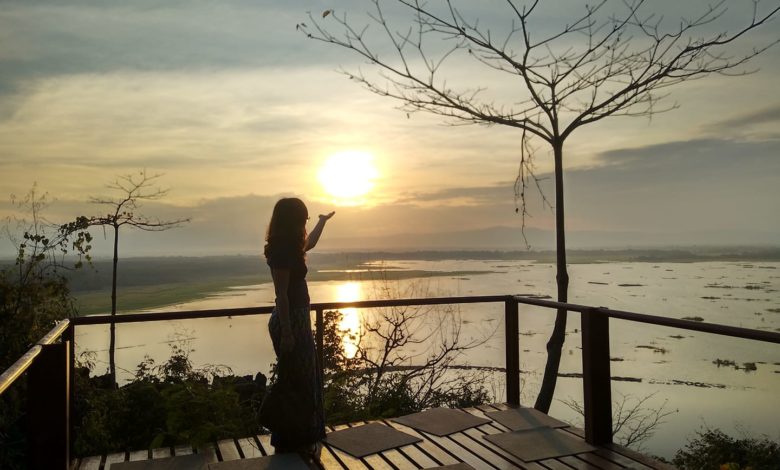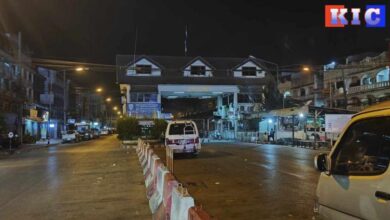Within a Month COVID-19 Took My Family
As a health worker, physiotherapist Naw Hsa K'Pru Moo, 28 knows the precautions people should take to stay safe from COVID-19. With a household of senior family members, she was extra cautious and locked-down her house in Kyimyindaing Township, Yangon, Burma well before health authorities imposed restrictions.

By Saw Wai Thoo and Sa I Sue
Despite her early prevention strategies, Naw Hsa K’Pru Moo was the only one who was to survive. Her grandmother, father, mother and an uncle, all died within a month of COVID-19. The effect of losing her family in over such a short period has taken its toll on Naw Hsa K’Pru Moo.
“I was really down… massive depression when I think I have no family left in my house.”
K’Pru Moo is an only child. Now alone in the empty family home made her depression worse and she had to ask relatives to come and stay.
Over the space of 18-days K’Pru Moo lost her immediate family- her father died on July 12, her grandmother on July 17, her mother on July 23 and her uncle on July 30.
Naw Hsa K’Pru Moo said she is still finding it hard to recover as she shared with Karen News the impact COVID-19 has had on her life and how she is trying to overcome the physical and mental of losing her family.
“At first, I almost lost hope and couldn’t find the energy to get out of bed – I stayed like that for many days and nights. Eventually, I told myself being sad and crying will not help me. I’m now trying to regain my physical strength by taking multi-vitamins and eating nutrient food. I’m listening to religious or meditation songs to try to mentally heal myself.”
Naw Hsa K’Pru Moo said when the first and second waves of COVID-19 struck Burma, she and her family never left home. During the third wave that began at the end of May, K’Pru Moo said the family had not left home for more than a month to avoid being infected.
By early July 2021, the third wave of COVID-19 hit Burma hard, especially Yangon, close to where Naw Hsa K’Pru Moo lives.
Naw Hsa K’Pru Moo and her family were still in lockdown and took all the necessary measures to prevent catching the infection. Naw Hsa K’Pru Moo suspects the virus must have been transmitted through oxygen cylinders brought into the house or by the nurse attending her 103-year-old grandmother who needed oxygen with a normal illness associated with her age.
“We didn’t leave home at the time of third wave in Yangon. But as my grandmother was on oxygen, we had to change cylinders and there was a nurse who came to see my grandmother. These are the only possible ways the virus could have been transmitted to our family.”
Naw Hsa K’Pru Moo said her father was the first to be infected. The next day, she also had COVID-19 symptoms.
“On July 9, both me and dad had fever. My dad quickly lost his appetite and couldn’t eat anything. I had fever and diarrhoea. It took our energy so quickly. I tried to keep myself strong, as I had to take care of my dad. Then, on day four, my grandmother and my mother had fevers.”
Without appropriate public health interventions by military appointed administration and arrest warrants issued for doctors and medical staff who protested against the military coup that took parliamentary power from the elected National League for Democracy, Covid-19 quickly spread, creating a national health disaster.
 People had to fend for themselves. People had to wait in long queues for hours to refill oxygen cylinders for patients in desperate need of oxygen. Volunteer rescue workers struggled to cope with the number of the dead needing to be picked up from homes and taken to Yangon cemeteries already pushed past their capacity – corpses began to pile up. Rescue vans bringing dead bodies were gridlocked in traffic jams outside cemeteries and crematoriums.
People had to fend for themselves. People had to wait in long queues for hours to refill oxygen cylinders for patients in desperate need of oxygen. Volunteer rescue workers struggled to cope with the number of the dead needing to be picked up from homes and taken to Yangon cemeteries already pushed past their capacity – corpses began to pile up. Rescue vans bringing dead bodies were gridlocked in traffic jams outside cemeteries and crematoriums.
Naw Hsa K’pru Moo said she is lucky to have many friends working in medicine, which did help her a lot, but in the end couldn’t save her parents.
“As my father’s condition worsen, I contacted all my friends at different hospitals as well as local clinics looking for an available hospital to admit dad. But none of the hospitals had free beds. I was told all hospitals around Inya Lake were full and YGH [Yagon General Hospital] was also full. Dad passed away during the night as I was trying to find a hospital to admit him.”
Naw Hsa K’Pru Moo said the family couldn’t make arrangement for her father’s funeral. The body was taken by officials from the local municipal for cremation according to Covid-19 regulations.
“Although the municipal officials came to take the body, we had to pack the body ourselves. They didn’t have enough people to do these things. I had to ask my friend from hospital to give me a zip-bag to put my dad’s body in. I couldn’t go to my dad cremation as I had to look after my grandmother and my mother.”
According to municipal regulations, houses with COVID-19 positive cases who died have to be locked down and cleaned by the relevant municipal staff. Naw Hsa K’Pru Moo said it did not happen and the family were told to take care of it on their own.
Five days later, on July 17, Naw Hsa K’Pru Moo’s grandmother passed away. This time, she didn’t do a COVID-19 test and just reported the death as the result of an old-age-illnesses. They arranged the funeral with a basic religious ceremony at a local cemetery.
Naw Hsa K’Pru Moo’s mother started to show signs of a fever, but was hopeful her mother would recover as she had reached day 11. Naw Hsa K’Pru Moo managed to get her mother admitted to hospital through a friend and former student of her mother who is a health department director.
“Mom was coping well at first. She could eat and showed signs that she was getting better. But as she had heart disease and high cholesterol, her blood oxygen levels kept dropping. She told me that she doesn’t want to live in this world with these diseases anymore. She gave up and quietly passed away in hospital.”
Her mother passed away on July 23 and her uncle on July 30 – Naw Hsa K’Pru Moo lost four loved family members within a month. Naw Hsa K’Pru Moo said she keeps going by thinking she still needs to live for her husband who is working in the United States. They married in late 2019 and didn’t have chance to spend time together as her husband couldn’t take holiday from his company.
“This is the one hope that keep me going. I must now live for my new family. We couldn’t see each other since the epidemic hit the world. He couldn’t come back and I couldn’t leave. I have been waiting for my paperwork processing to reunite with him since early this year. Things didn’t turn out to be smooth with COVID-19 and now the disruption of the military coup.”
Naw Hsa K’Pru Moo believes, despite people saying the pandemic is at its peak, there will be still more cases and more deaths judging by what she sees of the situation on the ground. Naw Hsa K’Pru Moo said when she regains her physical and mental strength, she is planning to volunteer to help people going through the same situation as she did.
“After a complete recovery, I plan to volunteer helping patients in need. That way, I can be helpful to others and it will keep me busy and stop me thinking what I went through – it makes me cry all the time.”
 As a COVID-19 survivor, Naw Hsa K’Pru Moo encourages people dealing with the sickness to stay positive, eat regular meals to replenish energy and to take responsibility not to spread the infection to other people. She also encourages people to follow prevention measures as precisely as possible and practice hygiene guidelines at all time. Naw Hsa K’Pru Moo warned it is important not to discriminate against individuals or families with tested positive for COVID-19, but instead to help as much as possible.
As a COVID-19 survivor, Naw Hsa K’Pru Moo encourages people dealing with the sickness to stay positive, eat regular meals to replenish energy and to take responsibility not to spread the infection to other people. She also encourages people to follow prevention measures as precisely as possible and practice hygiene guidelines at all time. Naw Hsa K’Pru Moo warned it is important not to discriminate against individuals or families with tested positive for COVID-19, but instead to help as much as possible.
“It is important to stay positive when fighting COVID. If you feel down, it will take you down.” If we stay strong, we will overcome it. It is important as a community that we do not ignore each other and to try help each other get through this difficult time.”




